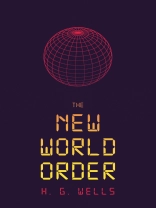Whether it is attainable, how it can be attained, and what sort of world a world at peace will have to be.
Today the phrase ‘New World Order’ evokes dystopian visions of enforcing a uniform international peace, Big Brother surveillance and legal order through a system of collective security and stringent control of a brainwashed citizenry.
H. G. Wells called for the complete socialisation of the world. He vocally criticised Soviet Communism and European Fascism, but he embraced certain measures these systems implemented, like the abolition of private property and the management of youth. He believed such courses of action were leading the world towards collectivisation and the unity of mankind. If we want true peace and prosperity to reign, Wells argued, there is only one way to bring it about: subsuming all human affairs under a single government and the establishment of a world state.
Wells laid the groundwork for a ‘paradise on Earth’ in this little book from 1940. His visions were apparently taken seriously by powerful financial and political circles that have gradually put them into practice over the last eighty years. Wells did not merely make predictions. There is little doubt that he was a major player in creating the current New World Order.
İçerik tablosu
Introduction by Constantin von Hoffmeister
1. The End of an Age
2. Open Conference
3. Disruptive Forces
4. Class War
5. Unsalted Youth
6. Socialism Unavoidable
7. Federation
8. The New Type of Revolution
9. Politics for the Sane Man
10. Declaration of the Rights of Man
11. International Politics
12. World Order in Being
Yazar hakkında
Herbert George Wells (1866-1946) is considered one of the pioneers of the science-fiction genre. His earliest and best-known novel is The Time Machine (1895). Wells’ works always contain social criticism, reflecting his aim to realise political ideas with the help of literature. With his dystopian oeuvre, he wanted to startle his compatriots out of their Victorian self-righteousness, criticise imperialism and warn against blind optimism about progress.












